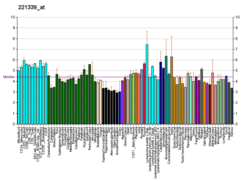OR10C1
Olfactory receptor 10C1 is a protein that in humans is encoded by the OR10C1 gene.[4]
Olfactory receptors interact with odorant molecules in the nose, to initiate a neuronal response that triggers the perception of a smell. The olfactory receptor proteins are members of a large family of G-protein-coupled receptors (GPCR) arising from single coding-exon genes. Olfactory receptors share a 7-transmembrane domain structure with many neurotransmitter and hormone receptors and are responsible for the recognition and G protein-mediated transduction of odorant signals. The olfactory receptor gene family is the largest in the genome. The nomenclature assigned to the olfactory receptor genes and proteins for this organism is independent of other organisms.[4]
See also
References
- ENSG00000229412, ENSG00000206474, ENSG00000220550, ENSG00000232397, ENSG00000204689, ENSG00000224234, ENSG00000235441 GRCh38: Ensembl release 89: ENSG00000230505, ENSG00000229412, ENSG00000206474, ENSG00000220550, ENSG00000232397, ENSG00000204689, ENSG00000224234, ENSG00000235441 - Ensembl, May 2017
- "Human PubMed Reference:". National Center for Biotechnology Information, U.S. National Library of Medicine.
- "Mouse PubMed Reference:". National Center for Biotechnology Information, U.S. National Library of Medicine.
- "Entrez Gene: OR10C1 olfactory receptor, family 10, subfamily C, member 1".
Further reading
- Fuchs T, Malecova B, Linhart C, et al. (2003). "DEFOG: a practical scheme for deciphering families of genes". Genomics. 80 (3): 295–302. doi:10.1006/geno.2002.6830. PMID 12213199.
- Volz A, Ehlers A, Younger R, et al. (2003). "Complex transcription and splicing of odorant receptor genes". J. Biol. Chem. 278 (22): 19691–701. doi:10.1074/jbc.M212424200. PMID 12637542.
- Mungall AJ, Palmer SA, Sims SK, et al. (2003). "The DNA sequence and analysis of human chromosome 6". Nature. 425 (6960): 805–11. doi:10.1038/nature02055. PMID 14574404.
- Malnic B, Godfrey PA, Buck LB (2004). "The human olfactory receptor gene family". Proc. Natl. Acad. Sci. U.S.A. 101 (8): 2584–9. doi:10.1073/pnas.0307882100. PMC 356993. PMID 14983052.
External links
- OR10C1+protein,+human at the US National Library of Medicine Medical Subject Headings (MeSH)
This article incorporates text from the United States National Library of Medicine, which is in the public domain.


